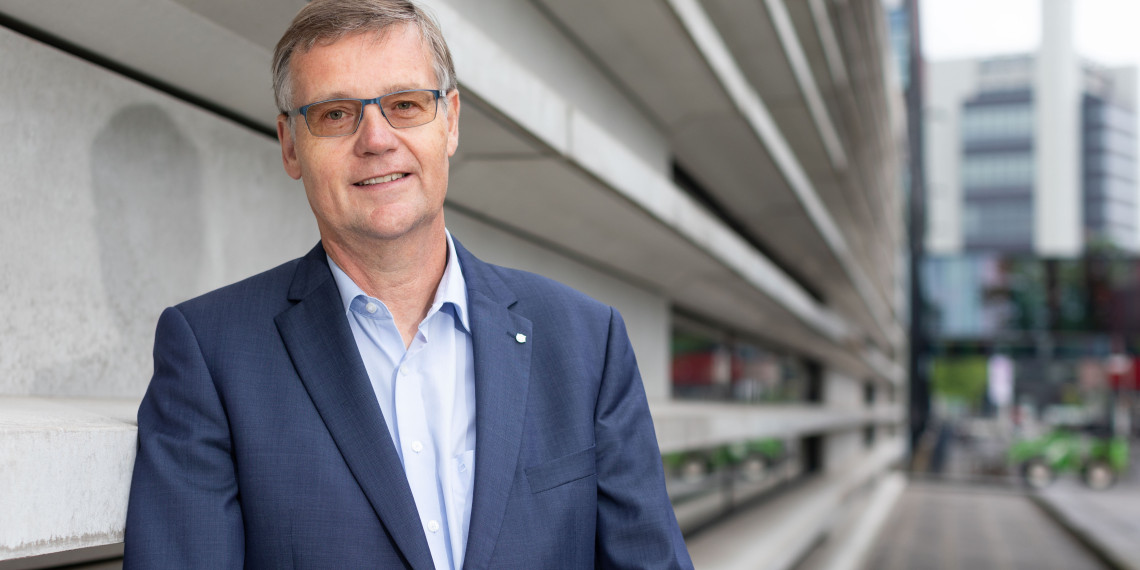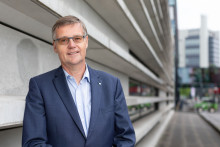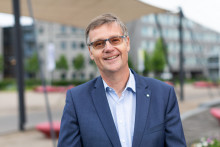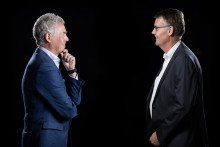Last week, you had a conversation with the action group Enschede Students for Palestine – a group that also protested at the Dies Natalis. How did that conversation go?
'There is a lot of emotion in the action group. And I get that, terrible things are happening in Gaza. The conversation was respectful and we tried to get somewhere together. That's positive, it wasn't just shouting like you saw in other cities. At the same time, the action group is making demands that we cannot meet. You might also wonder whether a university is the right place for protest that largely revolves around politics. A second meeting will follow with the action group*.'
* That meeting is still taking place, despite the action of the group at the Dies Natalis.
The group's demand – the severing of ties – has been seen before by climate protesters. What do you think of this way of campaigning?
'As a university, we don't have any secrets about collaborations, but it's not the case that there are lists of all our collaborations per country. Like Israeli universities, we are involved in EU research programmes, but that does not mean that we work together intensively. On the contrary. Protesters think it is obvious to break ties, but we don't want that. I share the idea that you have to take a critical look at who you work with, but by excluding you can be sure that you are not solving anything. This is about academic freedom. As rector, I'm not going to decide who our individual scientists do or do not work with, that's up to them.'
'I do not understand a demand that we should cut ties with Thales'
How do you get closer to each other with protesters?
'Some countries are subject to national or European sanctions, and we have to abide by them. In other cases, the academic freedom of the individual applies. That is the playing field. Everyone is allowed to have an opinion, but I do not understand a demand that we should cut ties with Thales, for example. Thanks to Thales radars, missiles are stopped, protecting civilians. Not every cooperation is black and white, even if the war in Gaza is a drama that only has losers.'
You recently extended your tenure as rector for four years. Why did you want to go on longer?
‘My work here isn't done yet. For the first year and a half, I was an online rector because of corona. Only in the last two years have I fulfilled my position in a normal way. What I notice is that more and more is being added, the way my agenda fills up is actually bizarre. All national meetings are physical and usually not in Enschede, so I spend a lot of time traveling every week. This week I'm in China because of seven years of overdue maintenance. The fact that I'm away for one week takes a big mortgage on the week before and after.'
(Text continues below the photo.)

Nevertheless, you continue.
'Absolutely, there is a lot to do. As the Executive Board, we are a strong team and we can switch quickly. This is necessary, because we play chess on so many boards that there is no room to discuss everything. Last week, in three days' time, we received a government agreement in outline, the Internationalisation in Balance Act and concrete instructions regarding Operation Beethoven. And then there are also major financial cutbacks.
'We think along, but we don't implement everything recklessly, that's not in our interest'
In Twente, we have a culture of short lines of communication: a great asset, but labour-intensive. If I want to do my job as rector well, I need to spend as little time as possible in my office. I try to create calmness and clarity to study programmes by asking them to start thinking about a Dutch-language programme. There will be a language test for each study programme and if that says: this programme is only allowed in Dutch, then you had better already thought about it. It seems like we are giving away a lot as a university, but we don't. We think along, but we don't implement everything recklessly, that's not in our interest.'
The UT is already having to make substantial cutbacks, the new cabinet wants to cut back even more on higher education and there will be a brake on international students: how do you, as an administrator, deal with such challenges?
'If it had only been the law on internationalisation, we would have been reasonably positive, because of exceptions to technological studies and the regional perspective. The coalition agreement is a different story. What surprised me about the budget cuts is the time it took for the message to land. I'm not disqualifying anyone, but it's only now that it's dawning on us in some places that we have to cut back. I understand that people think: I'm doing my job well, what's going on? But we are getting less and less money per student and per PhD candidate. I hope to know soon where we stand with the new government, but we cannot avoid major interventions. We are already cutting millions, but the new plans will have their consequences. The cuts are going to hurt.'
As rector, is that what worries you the most at the moment?
‘I'm more concerned about our autonomy being compromised. The fact that we are not allowed to choose the language in which we offer our education is something fundamental. That decision should lie with the study programme, not with an Executive Board or a national committee. If we're going to do everything in Dutch, we might as well get out of international academia. Something that has been built up over several generations can be completely demolished in five years. I'm afraid it will never return to the level it used to be.'
(Text contiunes below the photo.)

How do you deal with such developments that touch on the cornerstones of the university? More often, the need for the connection with society is mentioned. But that society votes quite massively for a party that wants to break down these kinds of foundations.
'Look, we also have to earn it – or earn it back, that trust from society. In the past, there may have been a kind of admiration of science. That creates a certain distance. What we want is to profile ourselves much more in certain impact areas: health, safety and climate. These are the research domains in which we want to have a visible societal impact and in which more and more convergence is now emerging. In addition, we focus on chip technology, which is not only developing geopolitically, but a domain where we can make a difference. After Brainport, Twente is the region where a lot is being done in this area. They assemble the machines in Veldhoven, but the parts come from Twente. We need to profile ourselves much more as a gateway to working in this industry.'
Could that be a more widespread message?
'Our PR and communication could be better. We have played a strong role in the regional energy transition, but that role remains underexposed – also in regional media. That's a shame. At the same time, it is not in our culture to pat ourselves on the back. On the other hand, if we did, you would alienate your own people. Bravado also doesn't suit me as a person. I don't think shouting louder is going to work. We are who we are.’
'Suppose FC Twente makes it to the Champions League, that could increase our influx of students'
Nevertheless, the UT has to show itself, also to attract students. How should this university put itself in the spotlight?
'The regional function is extremely important. At the same time, we are in a region with less and less influx from secondary schools. One of the steps we are taking, in collaboration with VU Amsterdam, is to give high school students from the Amsterdam region the opportunity to study technology. We are now also talking about reciprocity, starting VU programmes in Twente. In this way, we would create a regional offer for someone who is interested in a study, but is going to study elsewhere for the time being because that study is not offered here. But a choice of study can also arise from very trivial considerations. Suppose FC Twente gets through the preliminary round of the Champions League, that could increase our influx of students. Because we are the University of Twente. As crazy as it sounds, that's how it works.'
A year ago, you stated that lifelong learning will be just as important at the UT in 2030 as initial education, it will be the fourth leg under our table. Can this ambition be met financially?
'We're going to continue with it, but it's not going as fast and as vast as we'd like. Given the current financial tightness, it is already a lot that we are investing in this. But compared to the original ambition, it is only a fraction of the previously intended investment. At the same time, I stand by my earlier words. The demand for lifelong learning is enormous, partly because knowledge is changing so quickly. A major challenge is that we organise the demand in such a way that we not only know what the demand is, but that people and companies are also willing to pay for it. That they don't see it as a kind of favour, because we do add value.'
In one of the earlier interviews, you indicated that you wanted to work on a new vision for Master's education as rector. What is the current state of affairs?
'There is an overarching educational vision. A project is currently underway to create a master's portfolio. What you often see with master's programmes is that they originate very locally. Until recently, there was no control over that at all. What you have to ask yourself is what we need as UT. A master's portfolio can help to provide much more direction and guidance. And in doing so, we also need to examine our existing palette.'
What do you notice about this existing palette?
'One of the things I see is that we use quite a lot of old-fashioned names. Other universities have specific AI studies. At the UT, you have more than four programmes in which artificial intelligence is a significant part. But if I were a student and wanted to study something AI related, I wouldn't be able to find it here. That is not right, that has to change. In addition, due to the financial pressure, we will be taking a more critical look at the intake in both the master's and bachelor's programmes. We need to look much more closely than before not only at the educational content of a programme, but also at how profitable a programme is.'
'The ideal system for me would be that we would be less obsessive about tests'
Will it also be a matter of cutting back on bachelor's education?
'It is important that we look at future-proofing our education. The Twente Educational Model is a great system. But over the years, all kinds of things have grown around it, which is no longer efficient at all. We need to change that.'
Like?
'The way we deal with grade administration, there is literally shadow accounting going on. In addition, I sense that there is a little too much testing. If you reduce the pressure on exams, you save a lot of time, both for teachers and students. The ideal system for me would be that we would be less obsessive about tests and only look at achieving attainment targets. If you focus too much on small steps, the big picture will get lost out of sight.'
Does this also affect the well-being of students?
'Certainly, now also with the long-studying fine (langstudeerboete in Dutch, ed.) that the new cabinet wants to introduce. As a result, student activism is also under even more pressure. While that is exactly what makes us special and unique. Partly, part-time activism can be used to stick plasters, but I wouldn't want to think about, for example, the Kick-In can no longer be organised in the current way. Students must have the space to – let me put it this way – do something other than studying. Or to make mistakes, learn from them and then continue studying. We seem to brush off almost all of that. I sometimes hear the term curling parents, but I definitely don't want to have curling education.'
Can you prevent daily issues from being too prevalent?
'The visions you want to develop don't change. Only now they are very much – as I’d call it – polluted with the daily developments from the outside world. And that creates a lot of uncertainty. Now Vinod (Subramaniam, ed.) is doing much more in The Hague and the surrounding area. I try to be a filter from the outside to the inside, I also see it as my job to keep a bit of peace in the tent. That outside world is coming in anyway, faster than ever in the past year. I want to create peace and clarity, to be a stable beacon in the whole. Just as we, as a university, should be a beacon of calm and rationality. While also being pushed and pulled in the craziest ways.'
Given those erratic times, what kind of university do you hope this will be in four years' time?
‘I hope we're still being ourselves. That we are still relevant, that we are proud of the UT and that we have adaptively moved along with all societal developments. Sometimes we will have to make a move that we don't like ourselves, but that is also part of it, one way or another.’








